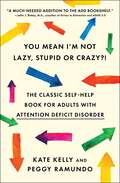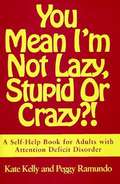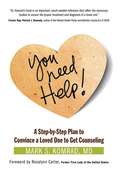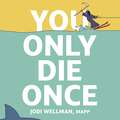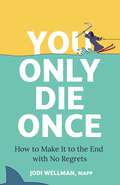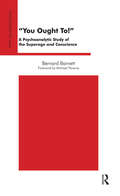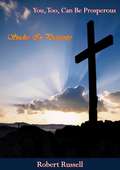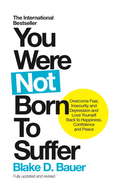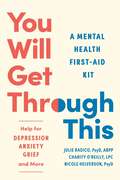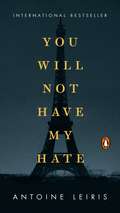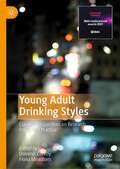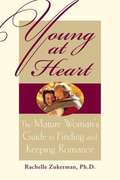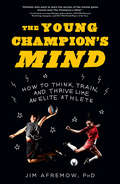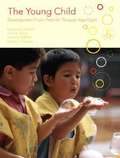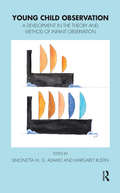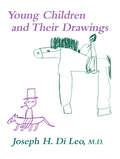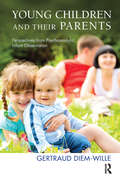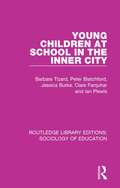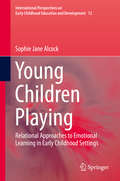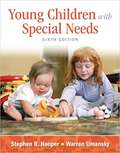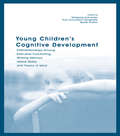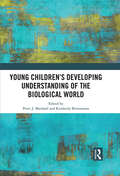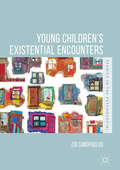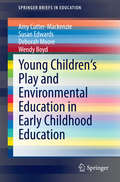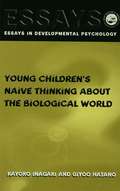- Table View
- List View
You Mean I'm Not Lazy, Stupid or Crazy?!: The Classic Self-Help Book for Adults with Attention Deficit Disorder
by Kate Kelly Peggy Ramundo M.D. Edward M. HallowellWith over a quarter million copies in print, You Mean I'm Not Lazy, Stupid or Crazy?! is one of the bestselling books on attention deficit disorder (ADD) ever written. There is a great deal of literature about children with ADD. But what do you do if you have ADD and aren't a child anymore? This indispensable reference -- the first of its kind written for adults with ADD by adults with ADD -- focuses on the experiences of adults, offering updated information, practical how-tos and moral support to help readers deal with ADD. It also explains the diagnostic process that distinguishes ADD symptoms from normal lapses in memory, lack of concentration or impulsive behavior. Here's what's new: The new medications and their effectiveness The effects of ADD on human sexuality The differences between male and female ADD -- including falling estrogen levels and its impact on cognitive function The power of meditation How to move forward with coaching And the book still includes advice about: Achieving balance by analyzing one's strengths and weaknesses Getting along in groups, at work and in intimate and family relationships -- including how to decrease discord and chaos Learning the mechanics and methods for getting organized and improving memory Seeking professional help, including therapy and medication
You Mean I'm Not Lazy, Stupid or Crazy?! The Classic Self-Help Book for Adults with Attention Deficit Disorder
by Kate Kelly Peggy RamundoStraightforward, practical advice for taking control of the symptoms, minimizing the disabilities, and maximizing the advantages of adult ADD. There is a great deal of literature about children with attention deficit disorder, ADD. But what do you do if you have ADD and aren't a child anymore? You Mean I'm Not Lazy, Stupid or Crazy?! focuses on the experiences of adults, offering accurate information, practical how-tos and moral support to help readers deal with ADD. It explains the diagnostic process that distinguishes ADD symptoms from normal lapses in memory, lack of concentration or impulsive behavior, and it addresses: Achieving balance by analyzing one's strengths and weaknesses Getting along in groups, at work and in intimate and family relationships -- including how to decrease discord and chaos Learning the mechanics and methods for getting organized and improving memory Seeking professional help, including therapy and medication Widely used by support groups around the country, You Mean I'm Not Lazy, Stupid or Crazy?! is the indispensable reference for anyone who faces the challenge of ADD on a daily basis.
You Need Help!: A Step-by-Step Plan to Convince a Loved One to Get Counseling
by Mark S Komrad Rosalynn CarterIf you feel that a friend or loved one has a problem and needs professional help, this step-by-step guide will give you the tools to approach, engage, and support him or her.Just about everyone knows a relative, friend, or coworker who is exhibiting signs of emotional or behavioral turmoil. Yet figuring out how to reach out to that person can feel insurmountable. We know it is the right thing to do, yet many of us hesitate to take action out of fear of conflict, hurt feelings, or damaging the relationship.Through a rich combination of user-friendly tools and real-life stories, Mark S. Komrad, MD, offers step-by-step guidance and support as you take the courageous step of helping a friend who might not even recognize that he or she is in need. He guides you in developing a strong course of action, starting by determining when professional help is needed, then moves you through the steps of picking the right time, making the first approach, gathering allies, selecting the right professional, and supporting friends or relatives as they go through the necessary therapeutic process to resolve their problems. Included are scripts based on Komrad’s work with his own patients, designed to help you anticipate next steps and arm you with the tools to respond constructively and compassionately.You will also find the guidance and information needed to understand mental illness and get past the stigma still associated with it, so you can engage and support your loved one with insight and compassion in his or her journey toward emotional stability and health.
You Only Die Once: How To Make It To The End With No Regrets
by Jodi Wellman"YOU ONLY DIE ONCE is a spirited and funny but also profound and highly practical manual for anyone who yearns to show up more fully and wholeheartedly for their all-too-finite time on the planet."Oliver Burkeman, New York Times bestselling author of Four Thousand Weeks: Time Management for MortalsHow many Mondays do you have left? Does that question send you into a panic spiral, or are you convinced that, unlike everyone in the history of life on earth, you will somehow avoid the tragic end and live to tell the tale? Statistically, we get about 4,000 Mondays in our lifetime, so if you're halfway through your life, you might have roughly 2,000 Mondays to go. The good news is that you are in charge of how you spend those days: toiling at a job you hate, or creating a career you love; scrolling mindlessly for hours a day, or pursuing the hobbies and travel that light you up; dreading the end, or living a full life that allows you to greet the Grim Reaper with a smile.Built around the principles of positive psychology, You Only Die Once is the jolt that will bring you back to life, no near-death experience required. Full of practical takeaways and research-backed content, this book will motivate readers to take action on the life they want to be living, acting like a defibrillator for the soul. Accompanied by author Jodi Wellman's charming illustrations, this book won't lecture you about eating more kale or insist that the only path forward is to quit your job and move to Provence (although it's not not suggesting you do that either. The latter, that is. We'd never ask anyone to eat more kale.). Instead, it's a real-life guide to small changes that reawaken your passion and curiosity for life. Packed with inspiring stories, exercises, quizzes, quotes, and a step-by-step plan to awaken the liveliest version of you, You Only Die Once is the healthy dose of mortality you need to start living with urgency and meaning.
You Only Die Once: How To Make It To The End With No Regrets
by Jodi Wellman"YOU ONLY DIE ONCE is a spirited and funny but also profound and highly practical manual for anyone who yearns to show up more fully and wholeheartedly for their all-too-finite time on the planet."Oliver Burkeman, New York Times bestselling author of Four Thousand Weeks: Time Management for MortalsHow many Mondays do you have left? Does that question send you into a panic spiral, or are you convinced that, unlike everyone in the history of life on earth, you will somehow avoid the tragic end and live to tell the tale? Statistically, we get about 4,000 Mondays in our lifetime, so if you're halfway through your life, you might have roughly 2,000 Mondays to go. The good news is that you are in charge of how you spend those days: toiling at a job you hate, or creating a career you love; scrolling mindlessly for hours a day, or pursuing the hobbies and travel that light you up; dreading the end, or living a full life that allows you to greet the Grim Reaper with a smile.Built around the principles of positive psychology, You Only Die Once is the jolt that will bring you back to life, no near-death experience required. Full of practical takeaways and research-backed content, this book will motivate readers to take action on the life they want to be living, acting like a defibrillator for the soul. Accompanied by author Jodi Wellman's charming illustrations, this book won't lecture you about eating more kale or insist that the only path forward is to quit your job and move to Provence (although it's not not suggesting you do that either. The latter, that is. We'd never ask anyone to eat more kale.). Instead, it's a real-life guide to small changes that reawaken your passion and curiosity for life. Packed with inspiring stories, exercises, quizzes, quotes, and a step-by-step plan to awaken the liveliest version of you, You Only Die Once is the healthy dose of mortality you need to start living with urgency and meaning.
You Ought To!: A Psychoanalytic Study of the Superego and Conscience
by Bernard BarnettThe superego is one of those psychoanalytic concepts that has been assimilated into ordinary language, like repression, the unconscious and the Oedipus complex. Because it has become such a familiar notion, its complexity may not always be appreciated, nor the controversy that it can inspire. Its origins, for example, its timing in the course of development, whether and how it is influenced by gender all these questions and others have been the source of lively disagreement. For psychoanalysts it is a fundamental concept of their discipline, but it belongs to a meta psychology whose value is often questioned, and opinions might vary on whether it remains truly alive as a generative, energising idea in contemporary psychoanalysis.
You, Too, Can Be Prosperous: Studies In Prosperity
by Robert RussellRobert A. Russell of the Church of the Epiphany in Denver was an Episcopal minister who taught what would now be recognized as new thought philosophy. Chapters on: The Prosperity Idea, What is Prosperity?, The Source of Wealth, The Magic Box, God Loves a Prosperous Man, Tuning Out Tuning In, Mind Models, Meditations on prosperity.-Print ed.
You Were Not Born to Suffer: Overcome Fear, Insecurity and Depression and Love Yourself Back to Happiness, Confidence and Peace
by Blake BauerIn this life-changing book Blake D Bauer explains why depression, addiction, physical illness, unfulfilling work and relationship problems are caused by years of hiding your true emotions, denying your life purpose and living in fear. Having already helped thousands of people around the world find lasting solutions that conventional medicine, psychiatry or religion couldn't offer, You Were Not Born to Suffer will show you how to free yourself from the destructive thoughts, habits and situations that are stopping you from being happy and well. In simple practical steps you'll learn how to slow down and create a healthier relationship to yourself that is based on acceptance, kindness, honesty and self-worth. You'll also find out how to transform the stress, anxiety and insecurity that result from constantly trying to please others into lasting confidence, self-respect and inner peace. Whether it's negative thinking, financial worry, loneliness, guilt or self-doubt that's holding you back, Blake Bauer's words will move you to take better care of yourself, heal old pain and courageously move forward. If you're ready to enjoy your life, feel passionate about your work and create fulfilling relationships, this book will support you to live authentically, love wholeheartedly and finally value yourself enough to put everyday health and happiness at the centre of your life.
You Will Get Through This: A Mental Health First-aid Kit--help For Depression, Anxiety, Grief, And More
by Julie Radico Charity O’Reilly Nicole HelversonAn all-in-one guide to taking charge of your mental health, with research-proven strategies to alleviate daily struggles such as depression, anxiety, panic disorder, ADHD, and insomnia Months-long therapy wait-lists. Out-of-pocket costs. Online misinformation. There are more barriers than ever to accessing reliable mental health care—and when your mental health is suffering, you need help now. This book, written by three practicing therapists, is your comprehensive mental health first-aid kit. Drawing on the techniques they use with their clients, they offer a holistic understanding of more than twenty all-too-common life challenges, plus compassionate, evidence-based strategies for when you’re struggling. Even better, these are techniques that anyone can do at home. In each chapter, you’ll find: what the research says about the issue coping mechanisms that are used in actual therapy rooms step-by-step guidance on using these strategies in real life and overcoming common obstacles tips for communicating about the issue with your loved ones You’ll also find practical advice on accessing professional help, deciding if a therapist is the right fit for you (and breaking up with them if they’re not), and paying for therapy. You Will Get Through This illuminates the road to wellness so you can take charge of your own healing.
You Will Not Have My Hate
by Antoine LeirisINTERNATIONAL BESTSELLER - "On Friday night you stole the life of an exceptional person, the love of my life, the mother of my son, but you will not have my hate." On November 13, 2015, Antoine Leiris's wife, Hélène Muyal-Leiris, was killed by terrorists while attending a rock concert at the Bataclan Theater in Paris, in the deadliest attack on France since World War II. Three days later, Leiris wrote an open letter addressed directly to his wife's killers, which he posted on Facebook. He refused to be cowed or to let his seventeen-month-old son's life be defined by Hélène's murder. He refused to let the killers have their way: "For as long as he lives, this little boy will insult you with his happiness and freedom." Instantly, that short Facebook post caught fire, and was reported on by newspapers and television stations all over the world. In his determination to honor the memory of his wife, he became an international hero to everyone searching desperately for a way to deal with the horror of the Paris attacks and the grim shadow cast today by the threat of terrorism. Now Leiris tells the full story of his grief and struggle. You Will Not Have My Hate is a remarkable, heartbreaking, and, indeed, beautiful memoir of how he and his baby son, Melvil, endured in the days and weeks after Hélène's murder. With absolute emotional courage and openness, he somehow finds a way to answer that impossible question: how can I go on? He visits Hélène's body at the morgue, has to tell Melvil that Mommy will not be coming home, and buries the woman he had planned to spend the rest of his life with. Leiris's grief is terrible, but his love for his family is indomitable. This is the rare and unforgettable testimony of a survivor, and a universal message of hope and resilience. Leiris confronts an incomprehensible pain with a humbling generosity and grandeur of spirit. He is a guiding star for us all in these perilous times. His message--hate will be vanquished by love--is eternal. From the Hardcover edition.
Young Adult Drinking Styles: Current Perspectives on Research, Policy and Practice
by Fiona Measham Dominic ConroyThis book brings together cutting-edge contemporary research and discussion concerning drinking practices among young adults (individuals aged approximately 18-30 years old). Its chapters showcase an interdisciplinary range of perspectives from psychology, sociology, criminology, geography, public health and social policy. The contributors address themes including how identity becomes involved in young adult drinking practices; issues relating to the non-consumption of alcohol within friendship groups; and the role of social context, religious and ethnic orientation, gender identity, and social media use. In doing so, they highlight changing trends in alcohol consumption among young people, which have seen notably fewer young adults consuming alcohol over the last two decades.In acknowledging the complex nature of drinking styles among young adults, the contributors to this collection eschew traditional understandings of young adult drinking which can pathologise and generalise. They advocate instead for an inclusive approach, as demonstrated in the wide range of disciplinary backgrounds, cultural perspectives, methods and international settings represented in this book, in order to better understand the economic, socio-cultural and pharmacological crossroads at which we now stand. This book will appeal in particular to researchers, theorists, practitioners and policy makers working in the alcohol and drugs field, public health and health psychology, in addition to students and researchers from across the social sciences.
Young at Heart: The Mature Woman's Guide to Finding and Keeping Romance
by Rachelle ZukermanThis insightful guide is written for mature women (40+) who are having trouble finding a compatible man to date or who are already in relationships, but have burning questions about sexuality, body image, money, or communication.
The Young Champion's Mind: How to Think, Train, and Thrive Like an Elite Athlete
by Jim AfremowSports psychologist Jim Afremow has earned accolades from Olympians to professional athletes for his insightful approach to training the mind, body, and spirit of a competitor. Now this award-winning coach is turning his talents to student athletes in the new young adult edition of his highly praised The Champion’s Mind. As student athletes strive to balance their school and sports accomplishments, Dr. Afremow’s sage advice will be a much-needed guide in helping them navigate the field—or rink or court.The Young Champion’s Mind covers such topics as:- Tips on how to get in a “zone,” thrive on a team, and stay humble - How to progress within a sport and sustain excellence long-term - Customizable pre-performance routines to hit full power when the gun goes off or the puck is dropped
The Young Child: Development from Prebirth through Age Eight (5th Edition)
by Margaret B. Puckett Janet K. Black Donna S. Wittmer Sandra H. PetersenA thorough updating of topics including: standards for early childhood programs, the mandates of IDEA, developmental theories, changing demographics, assessments, child care practices and bullying . For child development courses that cover prebirth through age eight, this widely used text discusses major development theories as they relate to physical, social and emotional, and cognitive domains. The book contains extensive applications for those who teach and work with young children, making it particularly appropriate for early childhood education programs.
Young Child Observation: A Development in the Theory and Method of Infant Observation (Tavistock Clinic Series)
by Simonetta M.G. Adamo Margaret RustinObserving young children at play is an everyday and often fascinating and pleasurable experience for many of us. It also has a great pedigree in the development of psychoanalysis from Freud's observation of his grandson's game with the cotton-reel onwards. This book describes the practice of observing young children in home and nursery settings in a systematic and non-intrusive way in order to expand our understanding of their emotional, cognitive, and social development. It uses a psychoanalytic lens to enrich the meaning of what is seen. How do minds and personalities take shape? How can we train people to see what is most relevant in helping children to develop? The chapters range from classic papers by famous practitioners of an older generation to observations completed in recent years in the UK, Europe, and the US. Observation of this sort has also spread to Latin America, India, Australia, Africa, and the Far East. The differences and continuities with Infant Observation are the starting point.
Young Children And Their Drawings
by Joseph di LeoPublished in 1996, Young Children and Their Drawings is a valuable contribution to the field of Psychotherapy.
Young Children and their Parents: Perspectives from Psychoanalytic Infant Observation
by Gertraud Diem-WilleThis book focuses on the intertwining between the development of a child's psyche and its parents' behaviour. It shows the importance of the earliest period of childhood for the development of basic emotional patterns of the personality.
Young Children at School in the Inner City (Routledge Library Editions: Sociology of Education #55)
by Barbara Tizard Peter Blatchford Jessica Burke Clare Farquhar Ian PlewisFirst published in 1988, this work reports on a major British study of children’s progress and behaviour in 33 infant schools. The research looks at children from nursery through to junior school and asks why some children had higher attainments and made more progress than others. Using observations not only in schools but also interviews with children and parents, the children’s skills on entering school were found to have an important effect on progress. In each school, black and white children, and girls and boys were studied, in order gauge whether gender or ethnicity were related to progress.
Young Children Playing
by Sophie Jane AlcockThe subject of this book is young children's emotional-social learning and development within early childhood care and education settings in Aotearoa-New Zealand. The focus on emotional complexity fills a gap in early childhood care and education research where young children are frequently framed narrowly as 'learners,' ignoring the importance of emotional functioning and the feelings with which children make sense of themselves and the world. This book draws on original data in the form of narrative-like framed events to creatively illustrate the complexities in children's diverse ways of feeling, thinking, playing, being, and becoming. Events illuminate the feelings and meanings of observed experiences in holistic and contextualised gestalts. Awareness of unconscious processes, the feeling of feelings, and cultural dimensions of development and meaning-making are addressed. The book emphasises the emergent and psychodynamic nature of children's development and learning with strong links to the role of play and playfulness in the events, drawing on two ethnographically inspired research projects that present theory, experience and practice in real-life events.
Young Children with Special Needs
by Warren Umansky Stephen HooperUnderstand typical child development from birth to five and how children with special needs develop differently. Explore six core developmental domains including: gross motor, fine motor and oral motor development, self-care, cognitive development, communication development, and social and emotional development. Read contributions from a variety of experts, each one explaining the latest early intervention strategies within their area of specialty. Learn the process of assessment and intervention and develop universal skills that best support children and their families. Study cases and discuss successful intervention and assessment methods.
Young Children's Cognitive Development: Interrelationships Among Executive Functioning, Working Memory, Verbal Ability, and Theory of Mind
by Wolfgang Schneider Ruth Schumann-Hengsteler Beate SodianA critical part of early childhood development is the development of "theory of mind" (ToM), which is the ability to take the perspective of another person. The main purpose of this book is to discuss and integrate findings from prominent research areas in developmental psychology that are typically studied in isolation, but are clearly related. Two examples are whether executive functions represent a precursor of ToM or whether ToM understanding predicts the development of executive functions, and to what extent children's level of verbal ability and their working memory are important predictors of performance on both executive functioning and ToM tasks. The chapters in this book give a detailed account of the major outcomes of this research. First, the state of the art concerning current understanding of the relevant constructs (working memory, ToM, executive functioning) and their developmental changes is presented, followed by chapters that deal with interactions among the core concepts. Its main focus is on theoretically important relationships among determinants of young children's cognitive development--considered to be "hot" issues in contemporary developmental psychology.Based on presentations made at an international workshop, this book is divided into two parts. In the first part, five teams of researchers present theoretical analyses and overviews of empirical evidence regarding the core constructs of memory, executive functions, and ToM. The next part deals with the interplay among the core concepts outlined in Part I with developmental trends in the interaction.
Young Children�s Developing Understanding of the Biological World
by Peter J. Marshall Kimberly BrennemanThis book explores current research on young children’s beliefs and knowledge about the biological world – otherwise known as ‘folkbiology’. Contributors discuss factors that shape the development of folkbiological knowledge, as well as possible interventions designed to counteract cognitive biases that can interfere with the development of scientifically informed reasoning about natural phenomena. Taken together, the papers provide insights into the contributions of cognitive biases to the development of biological misunderstandings and into the life experiences and contexts that can contribute to or impede accurate learning of biological concepts. As part of a wider literature, the insights provided by the authors are relevant to the design of educational experiences that will foster children’s exploration and further their understanding of life science ideas.The chapters in this book were originally published as a special issue of Early Education and Development.
Young Children’s Existential Encounters (Studies in the Psychosocial)
by Zoi SimopoulouThis book is a psychoanalytic observation of five children’s existential encounters in their ordinary life at the nursery. It is among the first within psychosocial literature to go beyond adult experiences and explore the existential in young children’s lives as it plays out in their everydayness in symbolic and sensory articulations and in relationship with others; including with the author as someone who arrived looking for it. The author offers analysis in the form of a writing inquiry into meaning, by means of an on-going movement between the self and the other, the interior and the exterior, and psychoanalytic and existential-phenomenological ideas. This is illustrated through a kaleidoscopic account of May, Nadia, Edward, Baba and Eilidhs’ encounters with nothingness, strangeness, ontological insecurity, death and selfhood as these emerged in the time they spent with the author embodying different forms – from concrete objects to dreams – exemplifying an attunement to existential ubiquity. With its relational ground, this work suggests the potential for adults – including researchers, therapists, trainees, educators and parents – to attune to their own existential encounters as a path to understanding those of children.
Young Children's Play and Environmental Education in Early Childhood Education
by Amy Cutter-Mackenzie Susan Edwards Deborah Moore Wendy BoydIn an era in which environmental education has been described as one of the most pressing educational concerns of our time, further insights are needed to understand how best to approach the learning and teaching of environmental education in early childhood education. In this book we address this concern by identifying two principles for using play-based learning early childhood environmental education. The principles we identify are the result of research conducted with teachers and children using different types of play-based learning whilst engaged in environmental education. Such play-types connect with the historical use of play-based learning in early childhood education as a basis for pedagogy In the book 'Beyond Quality in ECE and Care' authors Dahlberg, Moss and Pence implore readers to ask critical questions about commonly held images of how young children come to construct themselves within social institutions. In similar fashion, this little book problematizes the taken-for-grantedness of the childhood development project in service to the certain cultural narratives. Cutter-Mackenzie, Edwards, Moore and Boyd challenge traditional conceptions of play-based learning through the medium of environmental education. This book signals a turning point in social thought grounded in a relational view of (environmental) education as experiential, intergenerational, interspecies, embodied learning in the third space. As Barad says, such work is based in inter-actions that can account for the tangled spaces of agencies. Through the deceptive simplicity of children's play, the book stimulates deliberation of the real purposes of pedagogy and of schooling. Paul Hart, University of Regina, Canada
Young Children's Thinking about Biological World (Essays in Developmental Psychology)
by Giyoo Hatano Kayoko InagakiPresents research on the topic of young children's naive biology, examining such theoretical issues as processes, conditions and mechanisms in conceptual development using the development of biological understanding as the target case.
